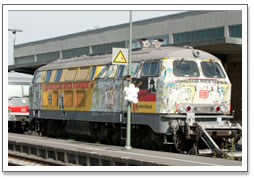

That's because they used a piece of BGM from the show, which was a slower rendition of the opening theme, and sung lyrics over it. It has a much less upbeat melody and includes a lot of lyrics (in contrast to the original Japanese version which was basically "Lupin the 3rd" over and over), but a closer inspection will reveal that it has the same basic melody.
#SONDERZUG NACH PANKOW INSTRUMENTAL FREE SERIES#
The Latin American dub of the first series of Lupin III has an odd example of this.
#SONDERZUG NACH PANKOW INSTRUMENTAL FREE TV#
Anyone who has seen the American TV broadcasts will quickly tell you the English dub uses the original Japanese ending themes, and the openings aren't broadcast at all due to time constraints (though they did air on Canadian TV and are on the DVDs and, yup, in Japanese). They are really made by the Italian dub, sung by Italians, and have only aired in Italy.


While the Portuguese dubs of Dragon Ball and Dragon Ball Z used the French versions for the melody and lyrics, the Dragon Ball GT dub uses the original melody with lyrics akin to the ones used before (including saying the name of the show on the song).The German dub is quite similar, except that it's a more note-for-note approximation of the melody.The Blue Water dub of Dragon Ball GT loosely adapts the melody of the original Japanese version (Dan Dan Kokoro Hikareteku), but with lyrics summarizing the plot (such as "We've got to find them all, gotta find those Dragon Balls").This means Chinese song dubs usually deviate heavily from English or other languages out of necessity. In a song, this significantly constrains what words you can use for specific notes in the melody. That's to say, the same sound can have completely different and even unrelated meanings depending on pitch. Each tone is effectively a "pitch pattern" that can be applied to any sound. Mandarin has 4 tones while Cantonese has 6 tones. note Chinese varieties have a particularly critical issue in that they have various tonal systems, e.g. To get good lyrics in another language, dubbers have to account for the general meaning of the song, the intent of the song-writer, the grammar of the song's original language, the song's rhythm and meter, how slang and idiom are used in the dubbed language, where the stresses fall in the song due to rhythm/melody, the new language's rhyming schemes compared to the original language and how that will be perceived in the language, and so on and so forth. And if dubbing the spoken dialogue weren't tough enough, dubbing songs can be downright hellish.


 0 kommentar(er)
0 kommentar(er)
